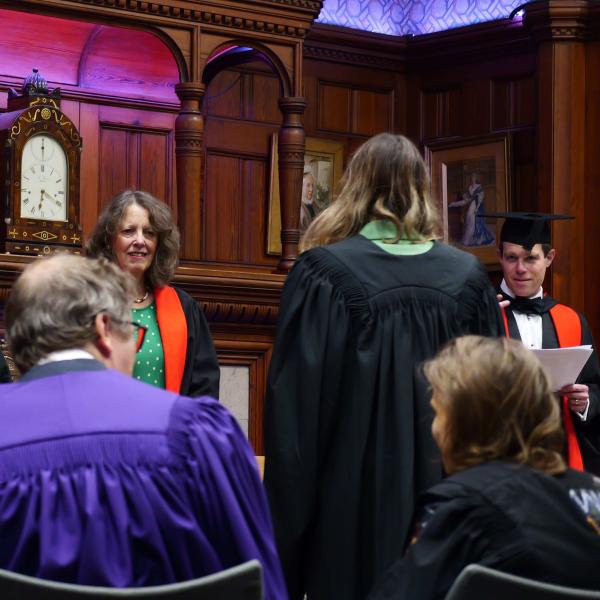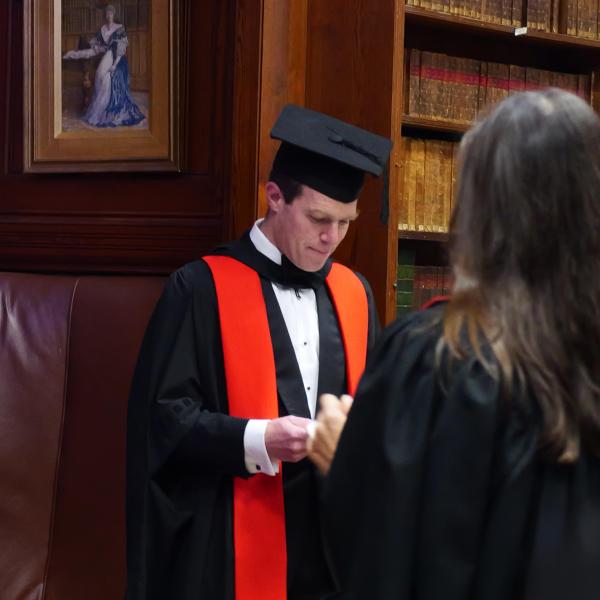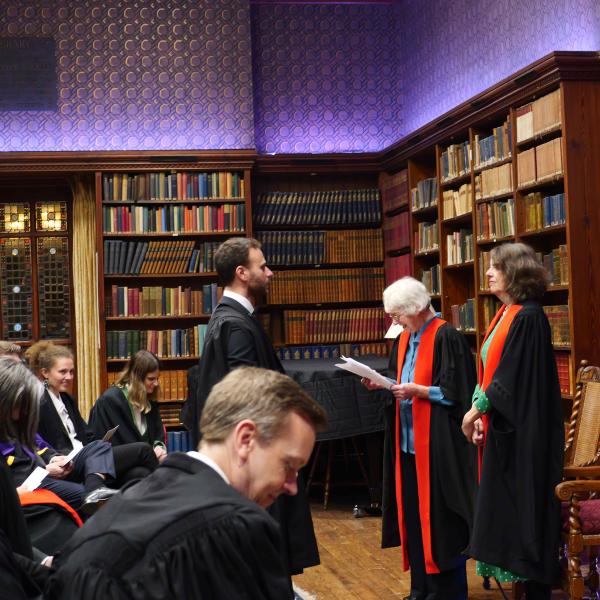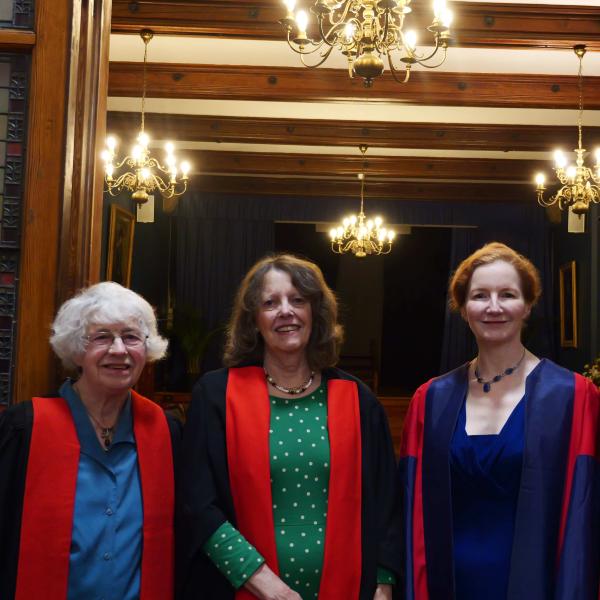News
Girton welcomes new Fellows for 2023-24
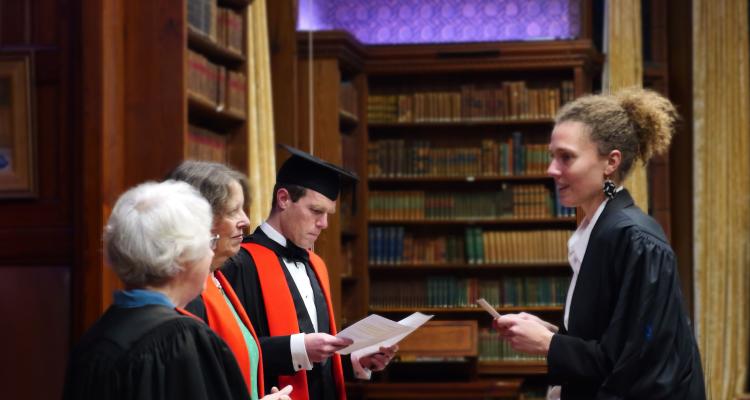
Hannah's research field of interest include:
- Beyond the Standard Model Phenomenology
- Collider Physics
- Cosmology and Astroparticle Physics
- Neutrino Physics
- Quantum Field Theory
- Standard Model Phenomenology
Jasmine specialises in twentieth- and twenty-first-century French literature and visual arts. She has a particular interest in women’s writing, intersectional feminisms, queer theory, critical race theory and postcolonial literature.
In her forthcoming monograph, ‘An End in Herself: Non-Motherhood in Contemporary French Women’s Writing’ (LUP) analyses the non-mother and narratives of maternal refusal in contemporary French women’s writing. In this project, she seeks to transform the largely pessimistic portrayal and valuation of non-mothers globally. In this work, she contends that there is a strong correlation between those Francophone authors who write about non-motherhood and their status as either migrants, non-white, part of a marginalised group and/or queer.
Jasmine's new research project is interested in rage in relation to contemporary francophone women of colour’s writing/cinema (Amandine Gay, Fatou Diome, Mame-Fatou Niang, Leïla Slimani, Faïza Guène, Fatima Daas, Alice Zeniter, Natasha Kanapé Fontaine).
Lena's research lies within the field of feminist, queer and intersectional legal studies with a focus on international law and sports law. She is generally interested in exploring how to conduct legal research through feminist, queer and anti-racist methodologies.
One of her current research projects looks at the role of international law in enshrining the gender binary in birth registration processes across the world. This also takes into account how legal developments on gender registration and trans rights have been shaped by hetero-sexism, global power inequalities and colonial legacies.
In another research project, She examines the gendered and racialised nature of international sports law.
Tor’s work is focused on the history and theory of international law, as well as critical and Marxist approaches to international law and left-legal theory more generally. Current research projects include a history of the pirate in international legal thought and a study of the relationship between anti-imperialism and international law in the 20th century.
Tor will be lecturing and supervising Tripos students in international law as well as teaching across a range of LLM papers.
He is also the co-General Editor of the London Review of International Law (Oxford University Press), which publishes critical, historical, socio-legal and other non-doctrinal international law scholarship.
Stephanie's research focuses on medieval codicology and palaeography, with an emphasis on quantitative and scientifically informed approaches to the materiality of books before print.
She completed her PhD at the University of Victoria in 2021 with a dissertation examining the use of parchment offcuts—poor-quality, irregular scraps generated as by-products of parchment-making—in manuscripts copied in later medieval England.
Her current research extends that work to Continental European contexts and deepens it through non-invasive imaging studies of parchment structure. A former Guest Researcher at Universiteit Leiden, Stephanie has published in Interdisciplinary Humanities, Florilegium, and Digital Medievalist.
Antonis' research work is in political economy and his interests lie between economics, philosophy, and politics. In particular, he is interested in Critical Realism and its implications for political economy, as developed by the Cambridge Social Ontology Group.
Currently, his research is focused on contributing to the development of a conception of social ontology most appropriately referred to as Social Positioning Theory, and an ethical theory known as Critical Ethical Naturalism.
Antonis is also a Research Associate at Centre for Business Research, Judge Business School.
Maria is an interdisciplinary scholar working predominantly in the entangled histories of Spain and Hispanic Latin America. In particular, her research and teaching focuses on anti-colonial and nationalist movements within Spain and Hispanic Latin America. Her PhD thesis analysed the origin, development and strategic use of anti-colonial ideas within Basque nationalism from 1892 to 1936. Maria is currently working on turning her PhD thesis into her first monograph.
She is also advancing a new research project, which will explore the attitudes on race and colonialism held by Catalan, Galician and Basques in the years preceding the end of the Spanish Empire in Cuba.
Lucio's research interests include international finance, empirical asset pricing, currency markets, asset management, microstructure, the interaction between macroeconomics and financial markets, especially the effects of monetary and exchange rate policy on asset prices. He was previously Director of Currency Research in the Fixed Income and Currency Team of AXA Investment Managers.
He is also member of the Finance subject group at Cambridge Judge Business School, which focuses on the investment and financial decisions of firms and institutions.
Alastair joined Cambridge University Libraries in June 2022, as Deputy University Librarian and Director of Academic Services at Cambridge
He was previously the Deputy Director for Libraries, Museums and Galleries at the University of Liverpool.
Read more about the appointment below:
History of the Ceremony of Admission
During the first 55 years of its history, Girton College had Lecturers and Directors of Studies, but no Fellows except for the Eugenie Strong Research Fellowship, established in 1910. There was thus no admissions ceremony in the early years of the College.
Girton’s first Charter and Statutes, granted in 1924, placed control of the College in the hands of the Mistress, Fellows and three members of the University Senate; 1924 was therefore the first year that Girton had Fellows. A “Ceremony of Admissions” of Fellows and Scholars was established in 1928 in a form not very different from the present version. The Fellows’ Register, the same register that is signed on the evening, was instituted in 1954 when the Revised Charter and Statutes of the College came into force.
Thank you to all those involved in this years Ceremony: The Mistress, Dr Elisabeth Kendall; The Vice-Mistress, Dr Hilary Marlow; The Senior Fellow among the Electors, Dr Dorothy Thompson; the Praelector, Dr Seb Falk; the Mistress’s Office; House Services and Girton College Catering staff. The ceremony was concluded by a celebratory dinner.

